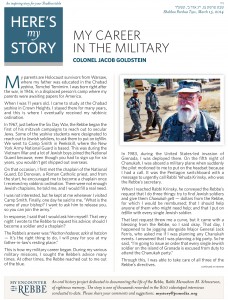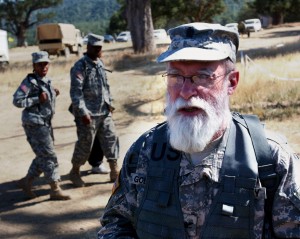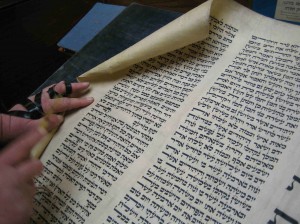HMS: My Career in the Military
My parents are Holocaust survivors from Warsaw, where my father was educated in the Chabad yeshiva, Tomchei Temimim. I was born right after the war, in 1946, in a displaced person’s camp where my parents were awaiting papers for America.
When I was 11 years old, I came to study at the Chabad yeshiva in Crown Heights. I stayed there for many years, and this is where I eventually received my rabbinic ordination.
In 1967, just before the Six Day War, the Rebbe began the first of his mitzvah campaigns to reach out to secular Jews. Some of the yeshiva students were designated to reach out to Jewish soldiers, to ask them to put on tefillin. We went to Camp Smith in Peekskill, where the New York Army National Guard is based. This was during the Vietnam War and a lot of Jewish boys joined the National Guard because, even though you had to sign up for six years, you wouldn’t get shipped out overseas.
On that occasion, I first met the chaplain of the National Guard, Ed Donovan, a Roman Catholic priest, and from the start he encouraged me to become a chaplain once I received my rabbinic ordination. There were not enough Jewish chaplains, he told me, and I would fill a real need.
I was not interested, but he kept at me whenever I visited Camp Smith. Finally, one day he said to me, “What is the name of your bishop? I want to ask him to release you, so you can join the army.”
In response, I said that I would ask him myself. That very night I wrote to the Rebbe to request his advice; should I become a soldier and a chaplain?
The Rebbe’s answer was: “Nachon hadavar, azkir al hatzion – It’s the right thing to do, I will pray for you at my father-in-law’s resting place.”
This is how my military career began. During my various military missions, I sought the Rebbe’s advice many times. At other times, the Rebbe reached out to me out of the blue.
In 1983, during the United States-led invasion of Grenada, I was deployed there. On the fifth night of Chanukah, I was aboard a military plane when suddenly the pilot motioned to me to put on the headset because I had a call. It was the Pentagon switchboard with a message to urgently call Rabbi Yehuda Krinsky, who was the Rebbe’s secretary.
When I reached Rabbi Krinsky, he conveyed the Rebbe’s request that I do three things: try to find Jewish soldiers and give them Chanukah gelt – dollars from the Rebbe, for which I would be reimbursed; that I should help any one of them who might need help; and that I put on tefillin with every single Jewish soldier.
That last request threw me a curve, but it came with a blessing from the Rebbe, so I said okay. That day, I happened to be jogging alongside Major General Jack Ferris, who asked me if I was planning any Chanukah events. I answered that I was planning a big party. So he said, “I’m going to issue an order that every single Jewish soldier on the island of Granada is excused from duty to attend the Chanukah party.”
Through this, I was able to take care of all three of the Rebbe’s directives.
The next day, I was on my way back to my aircraft carrier when my jeep got a flat tire. It turned out that the wheel was locked, so the driver sent up a flare to let others know we needed assistance. The sun was baking down on us, and I took off my helmet. All of a sudden I saw someone running down the hill, yelling Shalom! It was a Jewish soldier who saw my yarmulke with his binoculars. He had missed the Chanukah party, and he also mentioned that he’d never had a Bar Mitzvah.
“We’ll do it now!” I told him, and I put teffilin on him right there.
That’s when I realized what the Rebbe was talking about. You know, initially, when I was told to make sure to put teffilin on every single Jewish soldier, I just didn’t see how that could be possible. But the flat tire brought that one remaining Jew to me and, as a result, the Rebbe’s directive was carried out to the letter.
I have many stories to tell, but I’d like to share one that’s of a more personal nature.
When the Gulf War started in 1990, I was called up. My mother was distraught. Saddam Hussein had proclaimed that he was going to kill all the Jews in Israel with gas, and this was very scary to her – she had lived through the Holocaust when the Nazis had gassed Jews. So I brought her to the Rebbe.
When we came in, before my mother even said a word, the Rebbe said, “It will turn out well for Israel, it will turn out well for the Jews.” And immediately, she calmed down.
I told the Rebbe that I didn’t know exactly where I was going or how long it would actually last. To that the Rebbe said, “Wherever you’re going to go, it’s going to be over quick.”
Just before I was deployed, I came to the Rebbe again – this time I knew that I was going to Saudi Arabia – and got a blessing. I mentioned to the Rebbe that I was bringing a Megilla, the Scroll of Esther, with me because I expected to be there for Purim. Then the Rebbe replied in a strange way, which I didn’t understand, “The Megilla is going to be there but you’re not going to read from it.” He gave me a stack of dollars and told me to distribute them to the Jews I met – and as it turned out, I met many more than I expected.
At 4 a.m. the night before I was to depart from the United States, I got a call from the Pentagon – there was a sudden change of orders. I was not going to Saudi Arabia, but to Israel. The American commander on the ground there had requested a Jewish chaplain, and I was chosen.
Only when I hung up the phone did it dawn on me what the Rebbe meant. There were other Jewish chaplains with the allied forces in the desert, and they would read the Megilla on Purim to the soldiers. But, exactly as the Rebbe had said, I wouldn’t have to do it. I was on my way to Israel where I spent my tour of duty for the remainder of the Gulf War giving out Rebbe’s dollars.
I had so many incidents like this during my military career in the military. Whether it was in Granada or Bosnia or Holland or Macedonia, I was put in a unique position to help out other Jews. And it was all a result of the Rebbe’s foresight.
You know, sometimes chasidim have tunnel vision – we only see straight. But the Rebbe had this wide-angle view of the world, and he put me in the position to do something special. He told me, “Nachon hadavar – It’s the right thing to do.” I’ve been doing it for a long time now, thanks to him.
Colonel Jacob Z. Goldstein is the chief chaplain of the New York Army National Guard. He was interviewed in the My Encounter studio in New York, in October, 2013.








No Comments to “HMS: My Career in the Military”